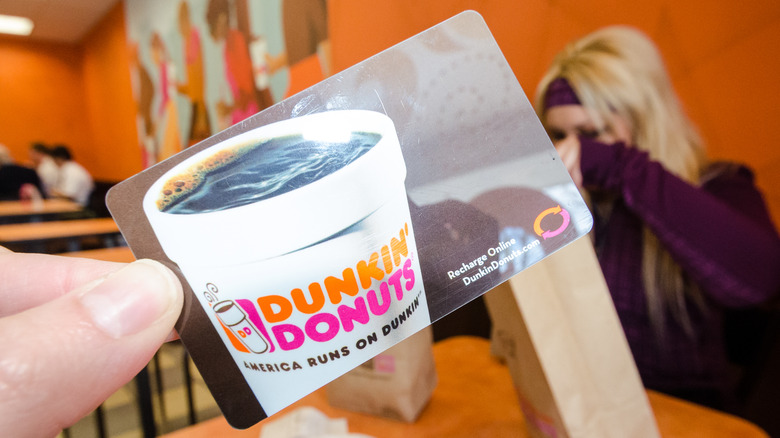The Dunkin' Gift Card Lawsuit Explained
A New Jersey man is filing a multi-million dollar lawsuit against Dunkin' Donuts over what amounts to pocket change. According to Top Class Actions, Dunkin' customer Daniel Crooks has filed what he hopes will be a class action lawsuit against the world's largest donut chain after he was denied a refund for the remaining money on his gift card.
According to the suit, which was filed in Massachusetts federal court on May 12, Dunkin' Brands Group Inc. is in violation of state laws in New Jersey and its home state of Massachusetts for not allowing cash refunds from gift cards. Info Law Group states that New Jersey, along with nine other states, requires merchants to provide cash refunds on gift cards when their remaining balance falls below a certain threshold. In New Jersey and Massachusetts, that threshold is $5 (via Top Class Actions), while in California it is $10 and in Rhode Island and Vermont, it is only $1 (via Info Law Group). However, Crooks notes in his complaint that while Dunkin' gift cards say they cannot be redeemed for cash, check, or credit unless required by law, stores have no way of actually cashing the cards out, even in states where they are required by law to do so upon request.
Despite only being denied a refund of $4.54, Universal Hub reports Crooks is seeking at least $5 million on behalf of all U.S. holders of Dunkin' gift cards.
Gift cards going to waste is nothing new
According to Top Class Actions, in his pursuit of coffee change, Crooks equates the non-refundable gift card balances to undisclosed user fees, and writes in the complaint that the company has "acquired at least millions of dollars in revenue to which they are not entitled."
The claim is not entirely unjustified. According to CBS News, Americans spent $200 billion on gift cards in 2021, a significant portion of which will never be spent. Nerd Wallet reports that while most gift cards are used within a year of purchase, 1 to 2% of gift card funds are never spent, resulting in a boon for retailers. These facts are part of the reason states have implemented laws like New Jersey's, which along with requiring low-balance refunds, requires increased transparency about refund policies and cap how much retailers can charge in dormancy fees (via New Jersey Consumer Affairs).
Crooks is represented in his suit by Bursor & Fisher, P.A., who claim to have represented half of all Americans in class action suits. Even if Crooks is successful in his bid to have the case certified as a class action suit, it will likely take years for gift card holders to see their awaited refunds. In the meantime, it may be better to not let the cards go to waste and spend them on an extra Dunkin' Treat.

